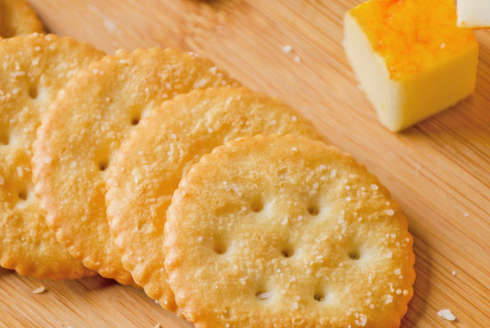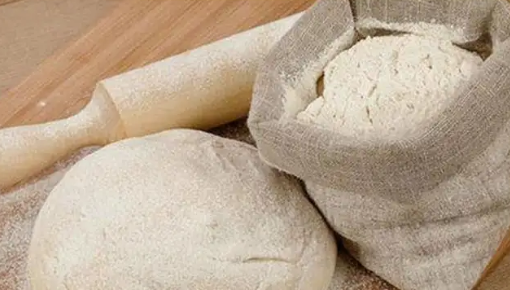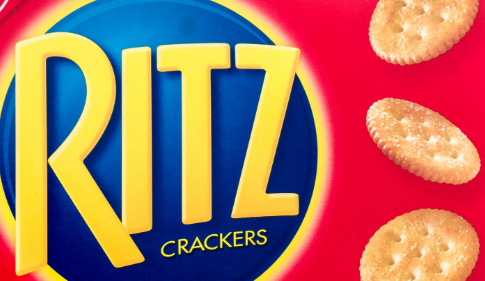Dogs can eat crackers, but only plain varieties without additional ingredients or excessive amounts of salt, sugar, or fat. Given that they have so few health benefits for your dog’s diet, crackers should only be given to your dog occasionally as a treat.
Your dog probably won’t get hurt if you give her a few Ritz Crackers every now and then. But if Ritz crackers account for more than 10% of your dog’s daily calories, they may have long-term effects due to their high concentration of fat, salt, and carbohydrates. I try to look for whole grain, low-calorie substitutes whenever I can to make my furry friend feel at home.
Table of Contents
- Can Dogs Have Ritz Crackers?
- Ingredients in Ritz Crackers That Are Harmful to Dogs
- Unbleached Enriched Flour is Harmful to Dogs That Are Gluten Or Wheat Intolerant
- Vegetable Oil Used to Make Ritz Crackers is Not Safe for Dogs
- Eating Excessive Sugar Can Cause Canine Obesity
- High Fructose Corn Syrup is Extra Sugar That Dogs Don’t Need
- Ingesting Excessive Salt Can Cause Sodium Poisoning in Dogs
- Leavening is Harmful to Dogs
- Soy Lecithin is Not Healthy for Canines and Not Great for Dogs With Soy Allergy
- Malted Barley Flour is Harmful to Dogs With a Gluten Allergy
- Are Ritz Crackers Good for Dogs?
- Ritz Crackers Nutrition
- Healthy Canine-friendly Substitute for Ritz Crackers
- How Do I Feed My Dog Ritz Crackers?
- Conclusion
Can Dogs Have Ritz Crackers?
Ritz crackers are not poisonous to dogs, but they are also not the healthiest option for dogs. The ingredients in Ritz crackers will be covered in more detail later, but in general, dogs with soy, wheat, or gluten allergies should avoid them.
Ingredients in Ritz Crackers That Are Harmful to Dogs
- Unbleached enriched flour contains niacin, reduced iron, thiamine mononitrate (vitamin B1), riboflavin (vitamin B2), and folic acid in addition to wheat flour.
- Soybean, canola, palm, and cottonseed oils with partial hydrogenation are examples of vegetable oils.
- Sugar.
- Salt.
- Calcium phosphate and baking soda for leavening.
- high-fructose corn syrup
- Soy lecithin.
- Malted barley flour.
- Natural flavor.
Let’s examine each one to determine which Ritz cracker ingredients are harmful to both the health and consumption of dogs.

Unbleached Enriched Flour is Harmful to Dogs That Are Gluten Or Wheat Intolerant
Unbleached enriched flour serves as the main component of Ritz crackers. Dogs can use unbleached flour, but it is not recommended. The safest and healthiest flours for dogs to eat are Amaranth flour, whole-grain wheat flour, oat flour, coconut flour, brown rice flour, buckwheat flour, and almond flour.
It is not a whole grain to use unbleached enriched flour. Furthermore, the term “enriched flour” denotes the removal of the majority of the minerals and vitamins from the original grain. Because these crucial vitamins and minerals were re-added, you can see niacin, reduced iron, thiamine mononitrate (vitamin B1), riboflavin (vitamin B2), and folic acid on the Ritz crackers nutrition label.
Please refrain from giving your dogs Ritz crackers if they have a wheat allergy because unbleached enriched flour contains wheat. When you give your puppies wheat or gluten when they are intolerant to those substances, it can harm their digestive systems because their immune systems will perceive and attack the GI tract as dangerous.
Dogs with gluten allergies will show the following signs and symptoms:
- intestinal swelling
- In order to relieve the itching, people often lick and chew their feet and skin.
- Poor skin conditions.
- Diarrhea.
- bald spots or bad hair.
- Due to scratching, paw pads are red and inflamed.
- chronic ear infections
Vegetable Oil Used to Make Ritz Crackers is Not Safe for Dogs
Ritz crackers should not be consumed by dogs due to the vegetable oils used to make them. For instance, soybean, canola, palm, and partially hydrogenated cottonseed oils are among the vegetable oils used in Ritz crackers. None of these are harmful or unhealthy for dogs.
Dog owners should only give their pooch the following type of oils:
- Coconut oil.
- Fish oil.
- Sunflower oil
- Olive oil.
- Flaxseed oil.
Additionally, allergies to soy may exist in some dogs. If your dog has a soy allergy, keep Ritz crackers out of their reach.
Signs of soy allergies in dogs include:
- dogs with ear canal infections shaking their heads or scratching their ears.
- Hair loss is brought on by frequent licking of skin and hair.
- Diarrhea.
- Vomiting.
- Blepharitis is an inflammation of the eyelids
- yeast or bacterial ear infection.
- White scaled, itchy skin rash known as seborrhea.
- an ongoing skin infection, such as pyoderma, where pus collects beneath the surface.
Eating Excessive Sugar Can Cause Canine Obesity
There is 1 gram of sugar in a serving size or 5 Ritz crackers. Even though it might not seem like much, it is a lot for our canine friends. Carbohydrates from their regular dog food provide dogs with the sugar they need to stay healthy. Extra sugar is not necessary.
The consumption of excessive amounts of sugar can result in long-term health problems like diabetes, weight gain, modifications to your dog’s metabolism, and even pancreatitis.
Additionally, your dog might have dental problems like cavities and enamel loss. The sugar between your dog’s teeth is the source of the acids that are produced by the acid in their mouth. Because it eats away at the enamel, the outer layer of the teeth, this acid is bad for your canine’s dental health. Dental disease will result as a result.
A dog’s stomach may become upset if they eat too much sugary food, among other immediate health issues. They may vomit or experience bloody diarrhea.
High Fructose Corn Syrup is Extra Sugar That Dogs Don’t Need
High fructose corn syrup, which is a type of sugar, is even sweeter than regular table sugar. Sugar is harmful to dogs in all forms, including high fructose corn syrup and regular sugar.
High fructose corn syrup also doesn’t come from a natural source. It is heavily processed and might even include mercury, a contaminant that the FDA does not regulate. It is a sweetener that can harm a dog’s teeth.
We strongly advise dog owners to refrain from giving their canine companions food or treats containing high fructose corn syrup because of this.
Ingesting Excessive Salt Can Cause Sodium Poisoning in Dogs
105 mg of sodium can be found in one serving or 5 Ritz crackers. Your dogs might exceed their recommended daily intake of sodium if they eat five Ritz crackers.
Avoid giving your dog snacks or treats that are high in sodium if they have high blood pressure, heart disease, liver disease, or kidney disease. Their health could deteriorate as a result. Ritz crackers should not be given to older dogs because they are more prone to these health issues.
Salt poisoning can occur from eating too much salt. Signs of sodium poisoning in dogs include:
- Nausea.
- Diarrhea.
- Vomiting.
Dog owners should refrain from giving their canine friends more salt than 1.5 grams per pound of body weight. It is dangerous and potentially fatal for dogs to go over this limit.
Leavening is Harmful to Dogs
Yeast, baking soda, or baking powder—all leavening agents—are poisonous to dogs. The leavening agents used in Ritz crackers can cause the following in our canine friends:
- Heart problems.
- Seizures.
- Spasms.
If you believe your dog has consumed some Ritz crackers, take him to the veterinarian right away because these signs and symptoms don’t always appear.
Fun Fact: Leavening agents are typically one of the ingredients in crackers that have a crunch, like the cheesy Goldfish snack, because they contribute to the texture of the crackers.
Soy Lecithin is Not Healthy for Canines and Not Great for Dogs With Soy Allergy
Soy lecithin is not good, even though it is frequently found in commercial dog food. As the name implies, soy is the source of soy lecithin, which is typically produced using genetically modified soy. Soy lecithin is a waste product as well.
Reading the ingredients can make it simple to confuse the two. In fact, as dog owners ourselves, we nearly missed this as well.
We strongly advise against feeding soy products to dogs. Ritz crackers should not be given to your furry family members if they have a soy allergy.
Malted Barley Flour is Harmful to Dogs With a Gluten Allergy

If your dog has a gluten allergy, you shouldn’t let them eat Ritz crackers because malted barley flour contains gluten. Tannins are also present in malted barley flour. When dogs ingest food with tannins, they can experience the following symptoms:
- Ulcers.
- Upset stomach.
- Seizures.
- Kidney damage.
The Ritz crackers nutrition label clearly states that its food product has the following Allergens:
- Soybeans.
- Wheat.
- gluten-containing breakfast cereals.
Ritz crackers should not be given to dogs who have a soy, wheat, or gluten allergy. When in doubt, speak to your veterinarian. To confirm any allergies your dog may have, the veterinarian will run a number of tests. Your dog will not hesitate to eat some, if not all, of the Ritz crackers if you leave them out. This is risky because a high-sugar diet can cause diabetes, weight gain, and eventually canine obesity.
Are Ritz Crackers Good for Dogs?
You can give your dogs one or two Ritz crackers if you give in to their puppy eyes. To avoid feeding them more than this, take care.
By consuming one or two Ritz crackers, dogs may experience the following health benefits.
Protein
One serving size, which is equal to five Ritz crackers, contains 1 gram of protein. Protein gives your dogs energy and aids in the development of their muscles. They benefit from a longer-lasting feeling of fullness as well.
However, we think that dogs should still get their protein from dog-friendly foods like chicken or eggs rather than Ritz crackers.
Calcium
Five Ritz crackers, or one serving size, contain 20 mg of calcium. Calcium is necessary for developing healthy bones and teeth. In fact, calcium prevents blood clots and maintains healthy muscle function in dogs. Overall, calcium aids in the prevention of agitation and twitching in dogs.
Although Ritz crackers contain calcium, we strongly advise dogs to get their daily calcium requirements from vegetables like kale, broccoli, or Brussels sprouts.
Iron
Five Ritz crackers, or one serving size, contain 1 mg of iron. Iron can help with the following in dogs:
- Prevent anemia.
- Transport oxygen.
- functionally sound enzymes.
Our furry friends should eat red meat, such as beef, fish heads or fish meat, or organ meats, to get the most iron possible.
Ritz Crackers Nutrition
Ritz crackers nutrition facts (1 serving size of 5 crackers or 16g)
| Name, Unit | Amount |
| Calories, cal | 80 |
| Total Fat, g | 4.5 |
| Saturated Fat, g | 1 |
| Sodium, mg | 105 |
| Total Carbohydrate, g | 10 |
| Sugar, g | 1 |
| Protein, g | 1 |
| Calcium, mg | 20 |
| Iron, mg | 1 |
| Potassium, mg | 13 |
The nutritional information for 1 Ritz cracker is shown below.
Ritz crackers nutrition facts (1 cracker or 3.2g)
| Name, Unit | Amount |
| Calories, cal | 16 |
| Total Fat, g | 0.9 |
| Saturated Fat, g | 0.2 |
| Sodium, mg | 21 |
| Total Carbohydrate, g | 2 |
| Sugar, g | 0.2 |
| Protein, g | 0.1 |
| Calcium, mg | 4 |
| Iron, mg | 0 |
| Potassium, mg | 3 |
Healthy Canine-friendly Substitute for Ritz Crackers
It’s preferable to choose low-calorie and whole-grain treat options for our canine friends rather than Ritz crackers. We feed our pooch these dog-friendly treats:
Alternative Cheesy Dog Snack
Healthy Spot Dehydrated Cheese Dog Treats
The healthy and tasty cheddar cheese treat is made entirely from natural ingredients. It is loaded with vital minerals and proteins.
Healthy Dog Treats
Wholesome Pride Pet Treats
The vegan, gluten-free, and grain-free sweet potato chew is part of this fruit and vegetable dog treat that is made entirely out of natural ingredients.
Healthy Dog Treats
Halo Vegan Grain Free Natural Dog Treats
The vegan, grain-free, and low-calorie crunchy dog treat comes in three flavors: sweet potato, carrot, and quinoa. It was produced in the USA using sustainable methods.
How Do I Feed My Dog Ritz Crackers?
We advise limiting the number of crackers your dog eats to a few every few days at most. To avoid the numerous health issues that can arise from consuming too much of this kind of food, it is best to only consume it occasionally.
Conclusion
Not all human food or ingredients are suitable or safe for our dogs when it comes to their diet or food. Double-check the ingredient list on the packet before giving your dog friends any food. We must be careful to avoid giving dogs our snacks or meals on a regular basis. They may suffer immediate and long-term health consequences from doing so.
Almost anything, even potentially harmful food, will be consumed by our furry friends. As responsible pet owners, it is our responsibility to ensure that we keep poisonous snacks and food away. Want to know more about which food dogs can eat? Check the following articles.
Can Dogs Eat Dried Mango? What You Need To Know – Everything Pets
Can Dogs Eat Cornbread? Everything You Need To Know – Everything Pets
Can Dogs Eat Scallops? Never Feed Raw Scallops! – Everything Pets
Can Dogs Eat Chorizo?-The Answer Is NO! – Everything Pets
Can Dogs Eat Grits? Are They Safe Or Not? – Everything Pets
Can Dogs Have Blue Cheese? Is Cheese Safe For My Dog? – Everything Pets
Can Dogs Have Hummus? Is It Safe For My Dog? – Everything Pets
Can Dogs Have Oat Milk? All You Need To Know – Everything Pets
